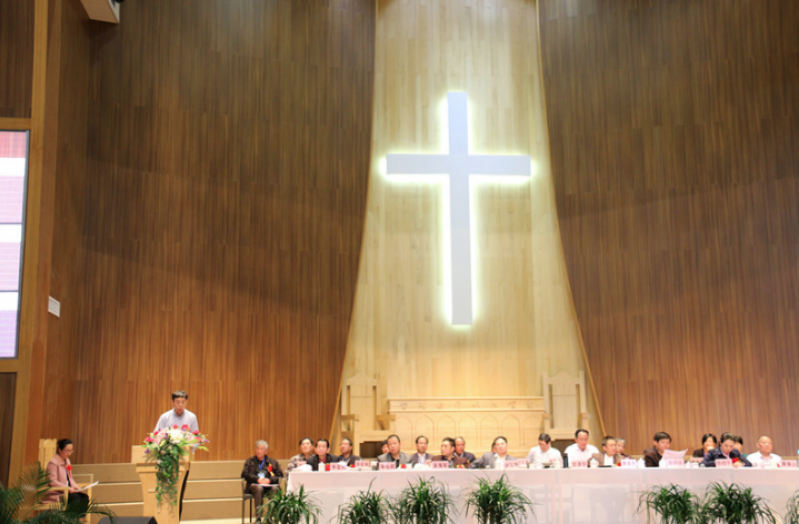
After China introduced religious regulations, it continued to maintain stability and started a series of indigenizing Christianity campaigns, such as theology exchange meetings and seminars. The sermons need to be guided by the thoughts of Xi Jinping and combine information of prosperity, patriotism, etc. A scholar points out that all actions aim to advocate the leadership of the Chinese Communist Party (CCP).
Sermons guided by the thoughts of Xi Jinping at CCC & TSPM Exchange Meeting in Fujian Province
On March 23rd, the China Christian Council (CCC) and the Three-Self Patriotic Movement of the Protestant Churches in China (TSPM) in Fujian Province announced on their website that they were holding "an indigenization of Christianity exchange meeting on the topic of preaching." All sermons at the exchange meeting must be selected and approved by CCC & TSPM. There will be a total of thirty "excellent" sermons at the meeting. The requirements for writing the sermons include three aspects: guided by the thoughts of Xi Jinping, highlight the theme of Christianity indigenization in China, and interpret the classic teachings of Christianity in a form that meets modern developments.
The circular also stated that the related theological thinking needs to be actively preached to the lower-class churches during sermons, especially for churches in remote rural areas. Because of the weak pastoral ability, such action can help these churches start nurturing believers according to the indigenisation of Christianity, enrich church activities and lift the spiritual lives of their believers.
This October, CCC & TSPM in Fujian Province will also hold "an indigenization of Christianity concert featuring excellent original Christian music in 2018." They ask all CCC & TSPM in the country to initiate and encourage Christian music writers and enthusiasts to participate. The requirements for creating Christian music include: Christian praise songs need to boldly resemble Chinese culture, tell about the modern world, and spread positive energy.
A theology advancement assembly in Quanzhou claims that Christianity must be indigenized in China
On March 22nd, Meilin Church held "the seventh Quanzhou Christian Theology seminar and advancement meeting." All government units, such as the Bureau of Ethnic and Religious Affairs of Quanzhou Municipality, the Quangong District United Front Work Department of the CPC Quanzhou Municipal Committee, etc., paid great attention to the meeting. Leaders of related government parties also attended the meeting and gave out important reports.
The theme of the meeting was "To keep watch; To practice." Pastor Liu Rongxi, chairman of Quangong District TSPM, expressed that the Quanzhou Municipal Committee asked the Christian community to incorporate the beliefs of "the 19th National Congress of the Communist Party of China."
Pastor Lin Dunqi, chairman of Quanzhou Christian Association, talked about the reflection of the indigenization of Christianity. He thought that Christianity in China had to continue indigenizing, such as integrating Christianity into Greater China, while forming independent theological thinking, and resisting the admiration of Western culture.
He also pointed out that churches had to abandon their suspicions about "the indigenisation of Christianity." For example, whether churches would be assimilated by the government or whether it would affect the universality of Christianity.
Pastor Lin Dunqi further mentioned that the current indigenization of Christianity had to deal with practical issues, such as churches resisting political infiltration and extreme behaviours deviating from the truth.
Pastor Lin Zewei, director of Quanzhou Christian Association, published an article about "the culture and historical mission of modern pastors." In the article, he discussed that because of the long history of the profound Chinese cultural, churches should lead believers to actively discover principals and doctrines that were compatible with Chinese modernization, so that believers would adapt themselves to the culture of the Chinese society proactively.
Chen Hong, deputy director of the Bureau of Ethnic and Religious Affairs of Quanzhou Municipality, said in his speech that there should be a clear direction for the development of theological thinking; the study should apply the beliefs of the 19th National Congress and put the new religious regulations into effect; the thinking should "establish a core socialism value for Christianity in Quanzhou and advance the progress of indigenization of Christianity in China".
A scholar points out that indigenisation of Christianity in China aims to advocate the leadership of CCP.
Professor Ying Fuk Tsang, director of the Divinity School of Chung Chi College at the Chinese University of Hong Kong, once mentioned in his article that the so called indigenization of Christianity in China meant CCP required certain contents in the Bible could not be damaging to "the harmony of socialism and modernization"; all religions had to protect the unity of the mother country, protect the unity of the Chinese nation, obey the highest interest of the country and advocate the leadership of CCP.
In order to reach this goal, a political "red line" was placed on the religious policy. Whoever stepped on the red line would face criticism and judgement. Professor Ying pointed out, "What's more frightening is that under this standard of pan-politicization, a lot of content in the Bible has to go through political scrutiny. The part of Christian belief that talks about the end times is perceived as critical, judgemental and denial to the modern world, therefore creates tension and is banned or constrained."
(Source: Gospel Herald)







